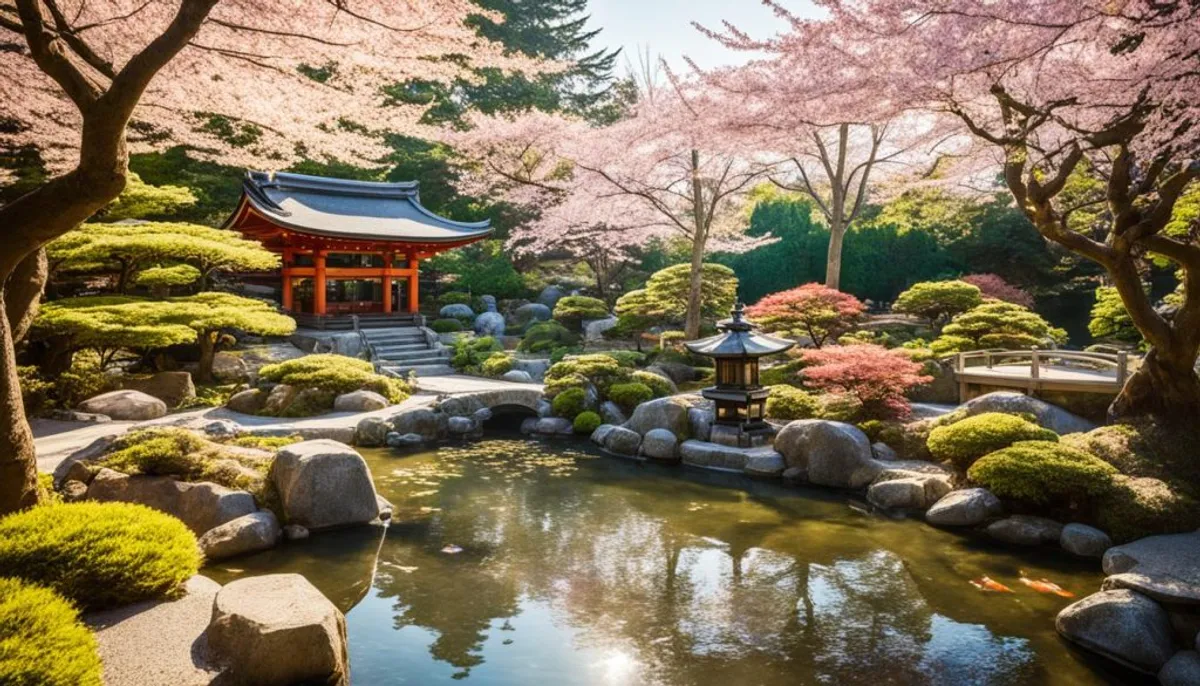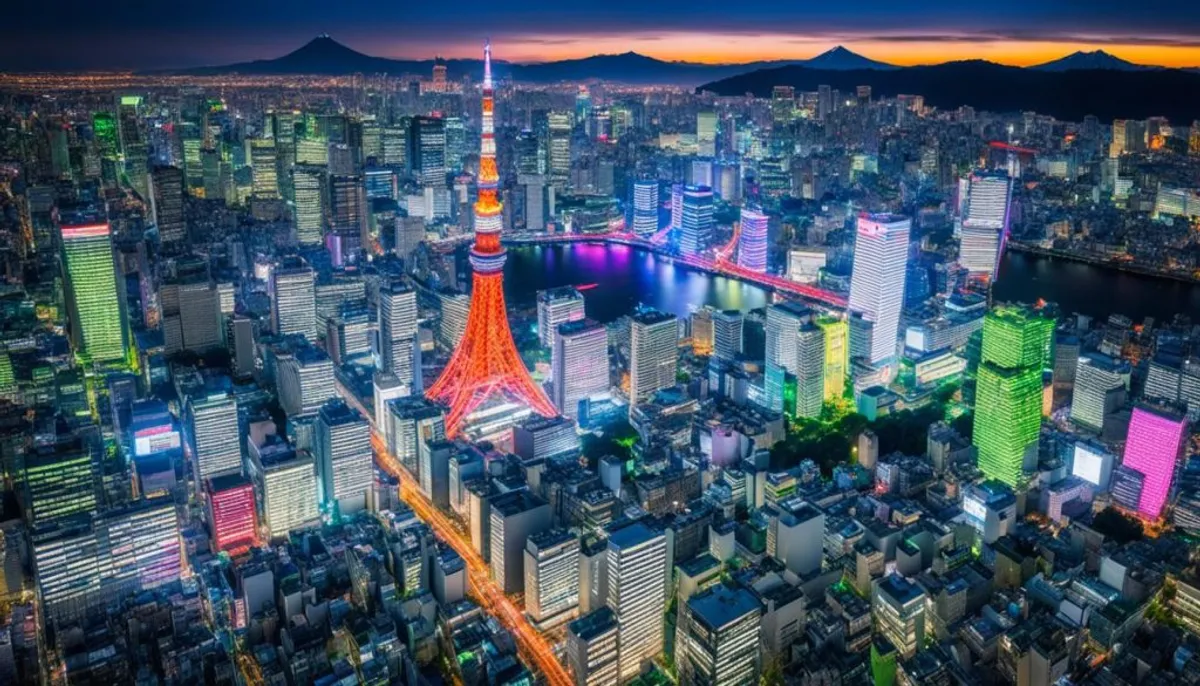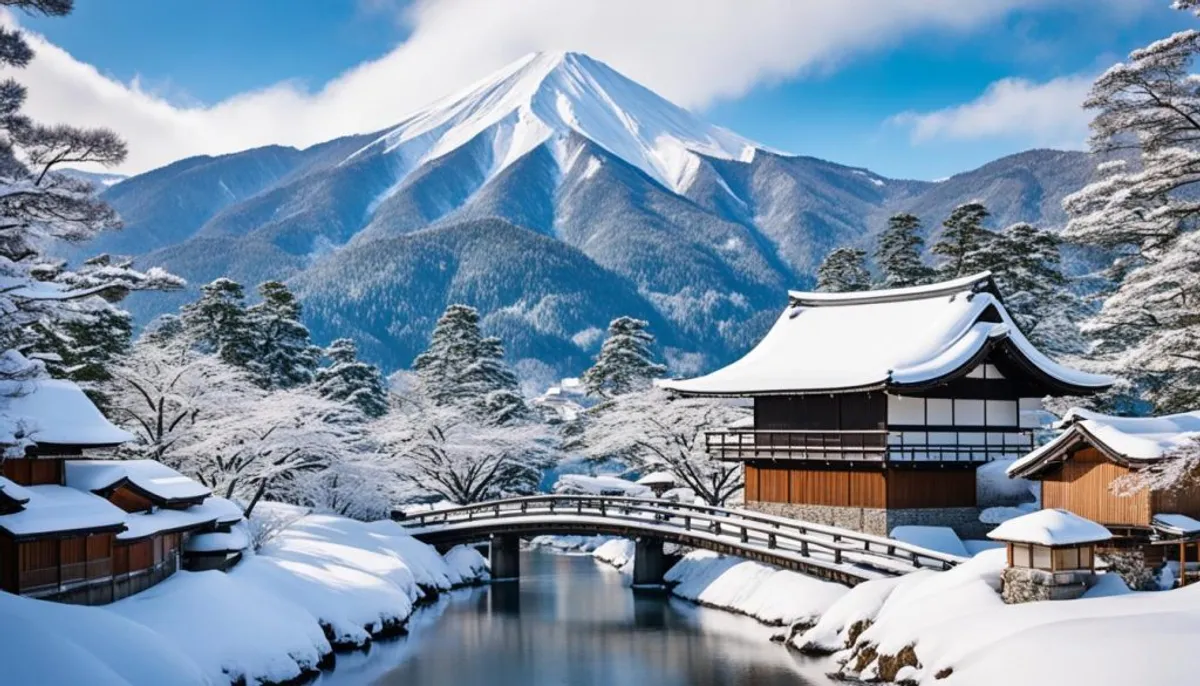The Japan is a fascinating country, where aging traditions coexist with impressive modernity. It is home to cultural treasures such as Buddhist temples, zen gardens, and tea ceremonies. These elements showcase a rich and ancient Japanese culture.
In contrast, large cities like Tokyo shine with their modernity. They are known for their skyscrapers and new technologies. This duality between past and present enriches Japanese art and Japanese cuisine.

The traditional architecture of Japan, with its curved roofs and zen gardens, reflects the desire to preserve Japanese traditions. It also embraces Japanese modernity. This unique blend makes Japan a fascinating country where history and the future meet.
What is Japanese culture
The Japanese culture is a unique blend of old traditions and modernity. Tokyo, the capital, is a perfect example of this mix. With over 13 million inhabitants, it combines impressive skyscrapers with ancient Japanese gardens, Buddhist temples, and modern architecture.
Japanese cuisine, with its sushi, ramen, and tempura, beautifully illustrates this balance between tradition and modernity. Visitors can thus discover Japanese culture in a unique way.
Tokyo, the ultramodern capital
Tokyo, the capital, embodies Japanese modernity. It features slender skyscrapers, bold architecture, and an urban dynamism. Yet, it also keeps Japanese traditions alive in its traditional gardens and ancestral temples.
The blend of the old and the new, tradition and modernity, is fascinating. This attracts visitors from around the world. Tokyo is a city where Japanese culture is constantly reinventing itself, offering a unique experience.

| Traditional Aspects | Modern Aspects |
|---|---|
| Centuries-old Japanese gardens | Slender skyscrapers |
| Buddhist temples | Avant-garde architecture |
| Traditional gastronomy | Urban dynamism |
Kyoto, historic city of a thousand temples
Kyoto, the former imperial capital of Japan, is a true cultural treasure. It is full of Buddhist temples, zen gardens, and traditional houses. These places showcase the art and beauty of Japanese culture.
The streets of Kyoto are also a meeting place for geishas and artisans. They keep ancient crafts alive. It is a chance for visitors to discover traditional Japan, away from the bustling life of big cities.
The Kinkakuji, Ginkakuji, and Kiyomizudera are among the most beautiful temples in Kyoto. The city also has many tea houses to explore the tea ceremony. The craft markets offer incredible traditional craft objects.
Kyoto is a jewel of cultural heritage in Japan. It offers a unique experience, away from the beaten path.
The Japanese Alps, a haven of traditions
The Japanese Alps hide a rural and authentic face. This mountainous region is full of traditional villages. There, one discovers the ancestral way of life of the Japanese. The ryokan, these traditional inns, offer an unforgettable stay.
Traditional villages and ryokan
Shirakawa-go and Takayama are treasures of Japanese nature. Their thatched-roof houses and picturesque alleys immerse visitors in the past. These traditional villages showcase Japanese culture in all its richness.
The ryokan are traditional inns where the welcome is warm. They offer comfortable rooms, natural hot springs, and delicious cuisine. Everything is steeped in tradition.
Mount Fuji and hot springs
The Japanese Alps are also known for their breathtaking landscapes. The Mount Fuji, this iconic volcano, attracts many visitors. The natural hot springs allow for relaxation and rejuvenation.

Whether in the villages, the ryokan, or facing Mount Fuji, the Japanese Alps offer a unique experience. Away from the hustle and bustle, this region allows for immersion in a preserved and authentic universe.
Japanese heritage through the ages
Japan is rich in Japanese cultural heritage. This heritage has been built over centuries. It spans from the early emperors of Nara to modern times.
Japan has experienced significant periods. It has witnessed the rise of feudalism and the culture of the samurai. The arrival of Europeans and industrialization have also marked its history.
Today, Japan preserves its traditions while opening up to the world. This is evident in traditional arts, gastronomy, and technological innovations. Japan has become a global leader.
The Japanese cultural heritage is rich. It includes temples and shrines, such as the Kinkakuji temple in Kyoto. There are also martial arts, masters of calligraphy and painting, and the tea ceremony.
Japanese gastronomy is also very famous. It features sushi, ramen, and tempura. These dishes are highly appreciated.
Japan has managed to preserve its ancestral Japanese culture while opening up to the world. Its history and art are unique. The cultural heritage of Japan is one of the richest and most diverse in the world.
Conclusion
Japan is an incredible destination that blends traditions and modernity. From Tokyo to peaceful villages, including Kyoto, it offers a unique experience. This country captivates with its rich culture and its balance between past and present.
Whether you love history, art, nature, or cuisine, Japan has something for you. Its culture, which combines tradition and modernity, invites exploration. It is a perfect place for those seeking an unforgettable travel experience.
Japan, with its Mount Fuji and ancient temples, offers unique experiences. It invites you to discover a world where tradition and modernity meet. It is an adventure for the senses and the spirit.
RelatedRelated articles


